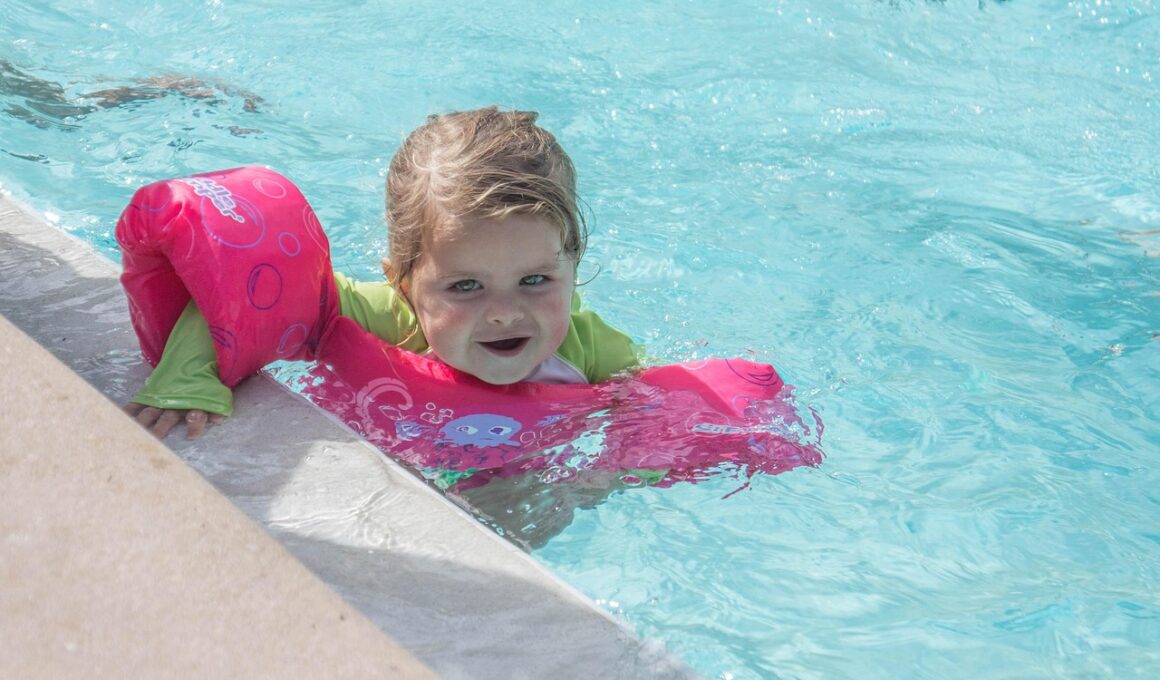The Connection Between Swimming and Academic Performance in Kids
Swimming is often seen as merely a recreational activity for children, but it has profound implications for their overall academic performance. Many studies indicate that engaging in swimming enhances cognitive abilities, particularly in young learners. For instance, consistent physical activity including swimming increases blood flow to the brain, which can contribute to better concentration and memory retention. These factors are essential for successful learning in school environments. Moreover, swimming helps children develop essential life skills such as time management and discipline, which can translate to academic settings. When kids learn to adhere to a practice schedule, they become accustomed to balancing their time, thereby improving their study habits and performance. Adding swimming to a child’s routine can positively impact their grades as they learn to set goals, stay focused, and strive for achievement. Apart from cognitive benefits, swimming also promotes physical health, reduces stress and anxiety, which can be highly beneficial during schoolwork or examinations. Swimming teams or classes can also foster social connections that enhance a sense of belonging, providing emotional support crucial for academic success.
Moreover, the link between swimming and better academic performance stems from how swimming encourages critical thinking and problem-solving skills. While swimming, children often face various challenges such as mastering techniques, improving their strokes, or competing against their peers. This environment fosters resilience and encourages kids to devise strategies to overcome hurdles, mirroring academic challenges they may encounter in school. The transferable skills gained through swimming can lead to enhanced creativity and a broader perspective when tackling subjects like mathematics or science. Furthermore, swimming is known to stimulate both sides of the brain, which plays a crucial role in developing spatial awareness and coordination. Children who swim regularly may exhibit improved mathematical abilities due to enhanced visualization skills. This physical activity supports neural development by strengthening connections between brain cells. Feedback from swimming coaches can also aid children in developing a growth mindset, promoting the belief that effort leads to improvement. These psychological benefits are critical in establishing a foundation for academic achievement and lifelong learning. Creating an environment where children develop a passion for swimming can facilitate their academic endeavors.
Building Confidence and Social Skills
Participating in swimming classes or teams offers children a unique platform to build confidence and essential social skills. The process of learning to swim can be challenging; however, as kids master their skills, they develop a sense of accomplishment that extends into various areas of their lives, including academics. This newfound confidence enables them to participate in classroom discussions, express their ideas, and present work without fear. Additionally, swimming promotes teamwork, as children often train and compete together, allowing them to forge friendships and provide each other with emotional support. Such social interactions are vital in school, helping to alleviate feelings of isolation or anxiety. As kids learn to collaborate with teammates, they also experiment with communication skills that are important when contributing to group projects or working on class assignments. Moreover, participating in team competitions can instill a sense of camaraderie, teaching children to celebrate each other’s achievements. The relationships built through swimming can serve as a support system during academic hurdles, providing encouragement and motivation for improvement. Thus, swimming becomes more than just an activity; it evolves into a foundational experience that supports their education.
Another significant aspect of swimming that influences academic performance is the discipline it instills in children. Consistent practice requires dedication, which can naturally lead to improved time management skills. As children make a commitment to attend practice sessions and adhere to training schedules, they learn to prioritize tasks effectively. This discipline translates seamlessly into their academic life, encouraging them to set goals, create study plans, and avoid procrastination. Additionally, the structure provided by swimming routines can mimic the schedules children encounter in school. Balancing swimming with school commitments teaches children the importance of adhering to routines, which can significantly enhance their focus during study sessions. Furthermore, children involved in swimming often learn to cope with the pressures of competition, preparing them for the academic challenges they will face. The ability to remain calm and composed under pressure is invaluable during exams and important presentations. Therefore, as swimming helps nurture discipline and perseverance, its consequences on a child’s academic performance can be profound, illustrating the important role of extracurricular activities in fostering successful learners.
Enhancing Health and Reducing Stress
Physical fitness is essential for cognitive development, and swimming serves as a fantastic way to achieve this. Regular exercise such as swimming helps children maintain a healthy weight, reduces stress, and enhances their overall mood. A healthy body often translates to a healthy mind, making it easier for children to concentrate on their studies. Studies show that physical activity reduces the levels of anxiety and depression, contributing to a better study environment at home or school. When children participate in swimming, they release endorphins, natural mood lifters that improve concentration and motivation. Increased vitality and energy levels make it easier for students to engage with their homework and assignments. Furthermore, swimming can sometimes provide a sense of escape from the pressures of academic life, allowing kids to unwind mentally. Engaging in this enjoyable activity can consequently lead to improved behavior in school, resulting in a more productive learning experience. The dual benefits of physical exercise and relaxation that swimming offers can help children balance their school responsibilities with their health and well-being. This equilibrium is essential for maximizing academic success.
In conclusion, the connection between swimming and academic performance in kids is evident through various factors such as confidence building, enhanced discipline, and improved health. Swimming cultivates essential life skills that extend beyond the water, positively impacting children’s abilities in school. The cognitive benefits derived from swimming, including better concentration, memory retention, and critical thinking, contribute to creating stronger learners. Additionally, as children develop resilience through overcoming challenges in swimming, they gain valuable problem-solving skills applicable to their academic endeavors. The social skills developed while participating in swimming help foster connections that support emotional well-being, allowing children to feel more comfortable in their school environment. Furthermore, swimming encourages discipline and time management, important traits for managing schoolwork effectively. More importantly, the health benefits derived from regular swimming sessions also contribute to reducing stress and anxiety, creating a conducive environment for studying. Encouraging children to embrace swimming can unlock their full potential academically by promoting physical fitness, emotional stability, and cognitive enhancement. Thus, swimming can be an invaluable tool in even the most successful educational journeys, paving the way for lifelong learning.
Getting Started with Swimming
For parents interested in introducing their children to swimming, it is crucial to start early and find a program suited to their age and skill level. Many community centers and swim schools offer introductory classes designed specifically for children, focusing on foundational skills and water safety. Parents should ensure that the program emphasizes a positive experience, allowing kids to build confidence without fear or pressure. This aspect is equally important as it encourages a lifelong love for swimming while reinforcing any academic benefits derived from participation. Additionally, setting achievable goals within swimming can be motivating, whether for completion of swim levels or participation in swim meets. Moreover, parents can support their kids by attending sessions, celebrating accomplishments, and creating a routine that incorporates swimming into their weekly schedule. Finding opportunities for swim playdates or family swimming outings can enhance social connections. Ultimately, getting started with swimming can create a strong foundation for a child’s holistic development and academic success. It is a valuable investment in their future that transcends the water, contributing positively to every aspect of their lives.


